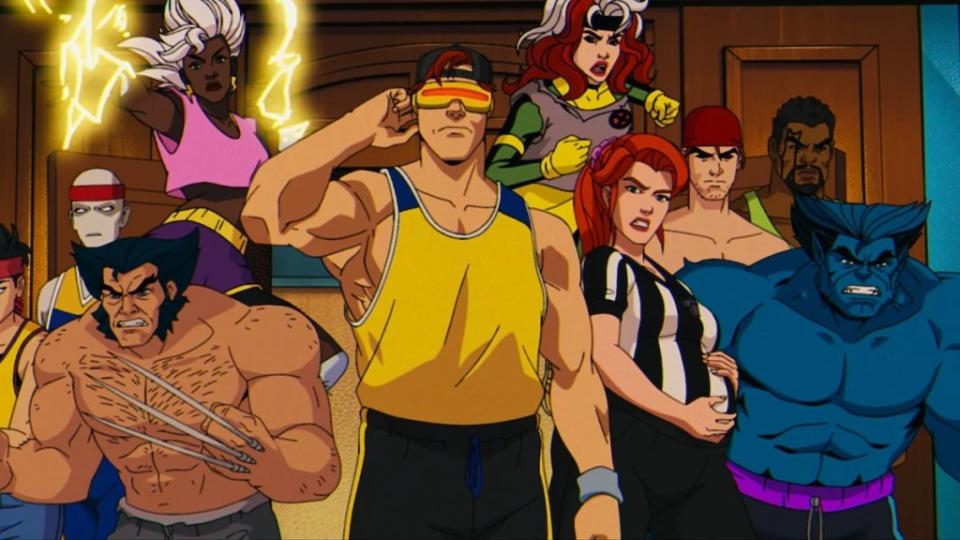How the ‘X-Men 97’ Team Revived — and Updated — a Beloved ’90s Series
The animated series “X-Men” ran for five seasons beginning in the fall of 1992 and was a staple of the Fox Kids afternoon programming block. It told the story of Professor Xavier’s School for Gifted Youngsters, a place where young people with special abilities (“mutants”) can learn to corral their powers and make the world a better place.
That is also the premise of the new Disney+ series “X-Men ’97,” which became a hit with viewers (94% audience score) and also with critics (99% on Rotten Tomatoes). One reviewer even suggested it deserves a Best Drama nomination.
That may be unlikely, but the positive reception is not lost on executive producer (and Marvel Studios veteran) Brad Winderbaum. “I feel like my whole career as a filmmaker was leading to me having the audacity to even try this,” he said.

“This” was bringing back the 1990s series for a new audience, something that he only attempted after the success of “What If…?,” Marvel Studios’ anthology series that imagines such scenarios as Black Panther leading the Guardians of the Galaxy or Tony Stark’s manservant Happy Hogan saving the Avengers at Christmas in a prolonged “Die Hard” homage. Winderbaum produced “What If…?” and had an open door to pitch additional animated projects to Marvel Studios president Kevin Feige. A new take on the animated “X-Men” series was the first thing he brought up.
“It was just a matter of finding like-minded people that had the same vision,” he said. “And that vision was to not just to revive the show but revive our memory of it. That’s where the complexities were born.”
To Winderbaum, the original series was powerful, especially if you watched it at a young age and saw it tackle some of the more iconic storylines from the original X-Men comic book series. This included the Phoenix Saga, where Jean Grey is possessed by an intergalactic deity. “The agony that the characters went through was very heightened when you’re watching as a kid. And especially for me, it was the first time I had ever seen anything like that on television,” Winderbaum said. “Here we are, 30 years later with an audience who has lived 30 years of life since watching that original show. To have the same emotional impact that you felt as a kid meant that the storytelling needed to be more sophisticated and build and pay off in bigger ways.”
To this end, Winderbaum and the team, led by creator Beau DeMayo (who was ousted shortly before the first season premiere), fully embraced the series’ comic book roots, unafraid to engage in more complex storytelling and character work. They also maintain the inherent metaphoric value of the mutants, whose otherness is often seen as dangerous by normal human society.
To ease into the oversized storytelling of the new series, Winderbaum points to the very first episode. “The reason episode 1 stands apart from the rest is because it fulfills the promise of the original series,” he said. That chapter introduces a new mutant (Roberto), who allows the audience to see through his eyes as he’s introduced to the wild and woolly world of the X-Men. The episode also features the team battling the Friends of Humanity and Sentinels, classic X-Men heavies.
One of the biggest episodes was the fifth one, “Remember It,” in which beloved team member Gambit (A. J. LoCascio) dies. “I watched that episode probably 30 times in various stages throughout the process, from animatic through final animation,” Winderbaum said. “I think I cried every time, and part of it is because it simmers in the pot for so long.” There were four episodes before it, released weekly, where audiences became invested in Gambit’s story. Gambit, to Winderbaum, is “representing the ’90s in some way,” along with everything else associated with the character (his romantic relationship with Rogue, his camaraderie with other team members). “There’s an extra tragedy to it.”
Given the response to “X-Men ’97,” it’s easy to wonder how the live-action movie that’s currently in development at Marvel Studios will stack up against it. “We’ve always helped each other on each other’s projects. It’s a tight-knit group and that philosophy is as strong today as it ever was,” Winderbaum said. “Every project, even our successes down the line, influence each other.”
The post How the ‘X-Men 97’ Team Revived — and Updated — a Beloved ’90s Series appeared first on TheWrap.


